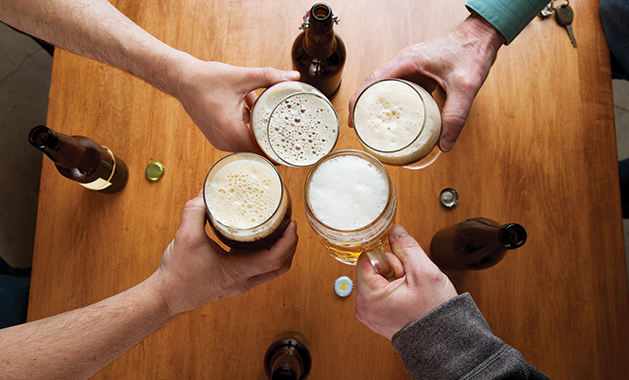
With microbreweries popping up all over the Twin Cities, it should be no surprise that another beer-related hobby is on the rise: homebrewing. Learning how to brew beer does require some special equipment, but it is a hobby anyone can do, especially with some guidance from Randy Mader, owner of Beer Meister, a homebrewing supply store in Medina. Not sure where to start? Mader says wheat beers and cream ales are both popular choices for summer.
“We also offer IPA kits, which are great on a hot summer day,” Mader says. “We offer a wide selection of kits to accommodate [homebrewers’] tastes year round.”
Those kits include both light and dark beers, such as cream ales, wheat beer, IPAs, pale ales, brown ales, stouts and porters, and seasonal beers such as pumpkin ale and spice beer.
You’ll also find the equipment to home brew. Home breweries can range from just a few pieces of equipment to an elaborate basement set up with thousands of dollars worth of equipment.
For three local homebrewers, homebrewing has become more than just a hobby. It is a way of life.
Bryan Rabe of Hanover
Bryan Rabe started brewing beer 17 years ago, after he was re-gifted a brewing kit from his dad. “I was in college at the time, and hey, free beer, why not!” Rabe says.
In 2011, Rabe was featured in a New York Times article about homebrewing which described how he had designed and installed a 20-gallon brewery system in a small basement room that once held his heating and air-conditioning system and water heater. He then stored his finished product in a refrigerated room next to the brewery and the cooling room fed directly to five taps in the wall of his basement bar.
The story was published six years ago, but Rabe says to this day he receives opportunities thanks to the story. He’s been featured in an article for the American Homebrewers Association, on podcasts and other websites. Rabe has moved since the story ran and says he’s currently “working on a new, better brew room.”
Rabe says he prefers light German lagers, pilsner and helles. “They are the perfect beer to me. Light in body, but not too light, hoppy, but not too much,” Rabe says. “Everything has to be perfect, and it is the hardest beer to make. I love a challenge.”
Kevin Meintsma of Wayzata
Kevin Meintsma first started homebrewing in 1981. After taking 15 years off, Meintsma got back into brewing.
“I’ve won almost a dozen best of shows for beer and cider, including a best of show at the second largest competition in the nation,” Meintsma says.
Meintsma now judges competitions as well as competes in them. He began brewing because he didn’t like most commercial lagers, and in 1981 there wasn’t much selection.
“A friend introduced me to the hobby, and I found I could make a pretty drinkable beer for a tiny investment in equipment [under $200],” Meintsma said. “It’s a fantastic hobby for people that are creative and like engineering and science.”
Meintsma has even used his skills as a brewer in his day job at Cargill.
“I work in Information Technology for Cargill, but I am widely known at the company as an enthusiastic brewer. The R&D group came to me and asked me to design and build a pilot brewery for them (on a VERY small scale). I am currently coaching beverage scientists to teach them the brewing process so they can test out ingredients that might be used in the brewing industry.”
Paul Anderson of Plymouth
Paul Anderson first tried homebrewing in 2001, and became a regular brewer in 2013. He started homebrewing because he enjoyed drinking beers that couldn’t be found in most bars.
“I liked going to Town Hall and Great Waters and having darker, maltier beers,” Anderson said. “My wife got me my homebrewing kit for Christmas and that was the beginning.”
At home, Anderson currently has three to four beers on tap which he changes occasionally. These may include an American porter, a smoked amber, a Scottish light and a pale ale.
He has won a blue ribbon at the Minnesota State Fair with a saison that he created for his wife. That beer also won Best of Show at other competitions. Anderson says competing is the best way to get feedback and improve.
“This year the National Homebrew Competition will have its final round in Minnesota. I’m entering three beers and hoping to advance to the finals for the first time.”









